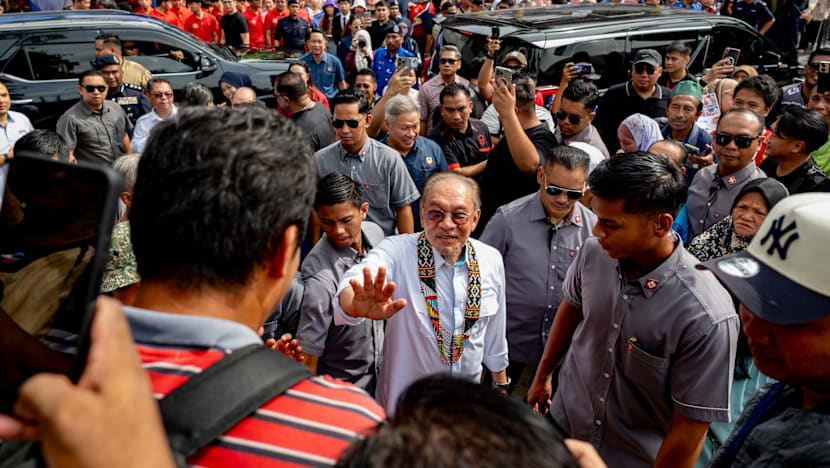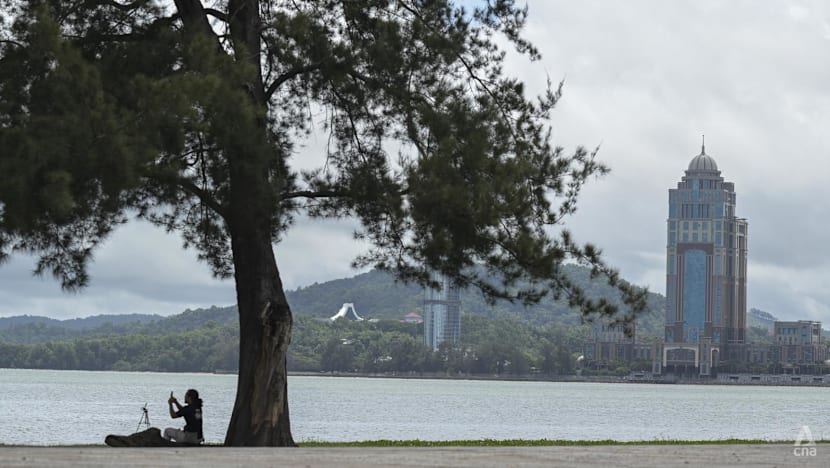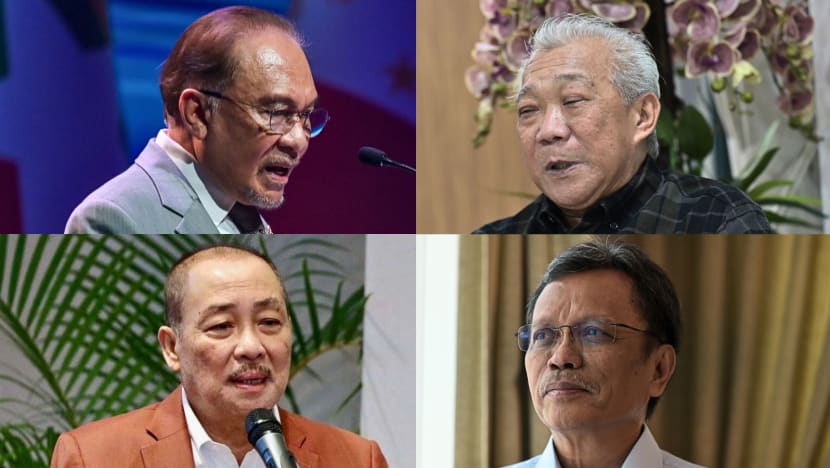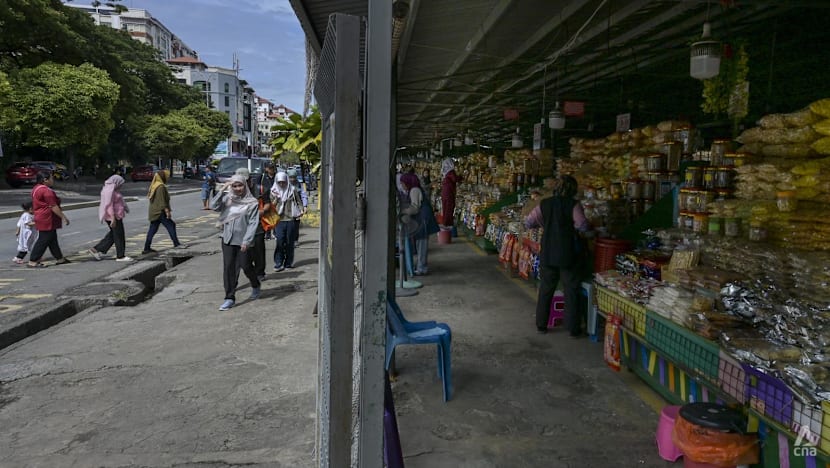analysis Asia
Political calculations behind Anwar government's move not to appeal Sabah's 40% revenue ruling
The federal government’s announcement is aimed at boosting the chances of peninsular-based parties in the Nov 29 Sabah state election, analysts say.

Malaysian Prime Minister Anwar Ibrahim gestures during a walkabout at the Gaya Street market in Kota Kinabalu, Sabah on Nov 9, 2025. (Photo: Facebook/Anwar Ibrahim)

This audio is generated by an AI tool.
KUALA LUMPUR: The Malaysian federal government's decision on Tuesday (Nov 11) not to appeal a high court ruling on its revenue-sharing failures with Sabah is a "carefully calculated" move aimed at cooling the political climate ahead of crucial polls in the state, say analysts.
The federal government’s move will help show its peninsular-based parties competing in the Nov 29 state election are serious about their commitments to Sabah and boost their chances at the ballot box, the experts add.
They also believe Prime Minister Anwar Ibrahim is hoping the Sabah election produces a Putrajaya-friendly state government that can strike a reasonable agreement on the state’s 40 per cent special grant entitlement.
Sabah has for years been trying to negotiate a return of its entitlement of 40 per cent of its contribution to federal revenue as stated in the Federal Constitution, an issue that is threatening to come to a head at the upcoming election.
Other Malaysian states like Sarawak, Penang and Johor have also been agitating for a larger share of federal revenues and greater powers in what some analysts see as a growing movement towards decentralisation.
But the Federal Constitution only mandates special grants for Sabah and Sarawak as equal partners with West Malaysia, while specifying that Sabah is entitled to 40 per cent of the net federal revenue collected from the state.
Even so, observers pointed out that the federal government still intended to appeal what it called "defects" in the Kota Kinabalu High Court's Nov 7 grounds of judgment, concerning allegations of abuse of power and constitutional breaches involving both the federal and state governments since 1974.
Johan Ariffin Samad, the former chief executive officer of Sabah’s Institute for Development Studies, said Sabahans are likely to read between the lines and not take the federal government’s non-appeal statement at face value.
“It doesn't make sense. You either appeal the whole judgment or not at all,” he told CNA. “It's definitely going to affect the state election's outcome as Sabahans are angry at Anwar for letting them down.”
APPEALING “DEFECTS” IN COURT JUDGMENT
On Oct 17, the Kota Kinabalu High Court ruled the federal government had acted unlawfully by failing to fulfil Sabah’s right to 40 per cent of federal revenue derived from the state for nearly 50 years.
Judge Celestina Stuel Galid declared that the special grant arrangements between the federal and state governments were “unlawful, ultra vires, and irrational,” adding that they violated the federal constitution.
Ultra vires refers to an act that goes beyond the scope or in excess of legal power or authority.
The court also ordered that an agreement be reached on Sabah’s 40 per cent share of federal revenue for each financial year from 1974 to 2021, with this process to be completed within 180 days.
The ruling, which came a day after the Election Commission announced that Sabah would head to the polls on Nov 29, has dominated the hustings so far.

The judgment provided further ammunition for Sabah-based parties that have long called for a more Sabah-centric state government - one that is firmer in pushing Putrajaya for the state’s full rights.
All eyes were then on whether the federal government would appeal the High Court decision.
“Even though the campaign officially hasn't started, the 40 per cent issue has been used as a platform to gain sympathy from voters,” Azmi Hassan, senior fellow at the Nusantara Academy for Strategic Research, told CNA.
Nominations for the state polls will be on Saturday, after which campaigning officially starts.
On Tuesday evening, the Attorney-General’s Chambers (AGC) and Prime Minister’s Office said in a joint statement that the federal government respects the principle of the special grant as outlined in the Federal Constitution.
“The federal government will therefore not appeal the special grant based on the 40 per cent revenue and will begin negotiations with the Sabah state government immediately,” the statement said.
However, the statement noted that the AGC also provided advice and recommendations to the Cabinet on “defects” in the court’s judgment.
“These included allegations that both the federal and state governments had abused power and violated constitutional obligations - a matter potentially dating back to 1974,” the statement said.
“The federal government intends to appeal these defects in the court’s judgment.”
STAKES OF SABAH ELECTION
Universiti Malaysia Sabah (UMS) political analyst Anantha Raman Govindasamy said Putrajaya wanted to “reduce” the political temperature ahead of the Sabah polls.
“I think it is a carefully calculated strategic move by the federal government, given that the state election is just around the corner,” he said.
If the federal government had appealed the decision, another analyst believes peninsular-based parties like Anwar’s own Parti Keadilan Rakyat - which intends to contest 10 seats in Sabah - would “absolutely lose”.
“Now, all these parties can say, 'See, we are truly Sabah nationalists. We managed to convince the PM not to appeal,’” said James Chin, a professor of Asian studies at the University of Tasmania.
That said, Chin pointed out that the federal government’s statement showed it was “not happy” with the reasons behind the High Court’s decision, and that it was ultimately “still going to appeal”.
This would allow the federal government to apply for leave on the High Court ruling, and give it more time - beyond the stipulated 180 days - to thrash out a deal with the new Sabah state government, Chin said.
This includes how much to pay Sabah for the “lost years” between 1974 and 2021, an amount that Chin estimated can go up to billions of ringgit, as well as the timeframe for payment.
In parliament on Thursday, Anwar said he wanted to clear the confusion after some deduced that the federal government’s appeal against the defects would implicate the Sabah special grant issue.
“I’m clarifying again that there will be no appeal in the issue of the special grant, period,” he said.
The High Court had made “serious” statements against previous federal and Sabah state governments, Anwar said, referring to language used in the judgment like “illegal” and “irrational” among other things.
“How can the federal government remain silent when it’s said that we have acted unconstitutionally since 1974?” he asked.
“It’s never happened before that a court has passed such a harsh judgment and implicated multiple governments in history.”
Anwar said this was a decision that “needed” to be appealed, and that he hoped a higher court could expunge the “serious accusations”.
Nevertheless, Anwar said the federal treasury has reached out to the caretaker Sabah state government to begin technical discussions on the special grant and to avoid further delays.
This process will “wait” for the conclusion of the Sabah election, and involve the new state government and chief minister, he said.
“Some quarters are more rational and ready to negotiate … If I can add, find a state government that adopts a more positive approach. So, negotiations can be easier and faster,” he added.

Chin from the University of Tasmania said the Sabah election is “so crucial”.
“If you have a federal-friendly state government, obviously they will come up with some sort of figure that is more reasonable compared to a strong Sabah nationalist government,” he said.
In his view, the “best case scenario for Anwar” is if incumbent Sabah Chief Minister Hajiji Noor’s Gabungan Rakyat Sabah (GRS), an alliance of several local parties, wins in the Nov 29 state election.
GRS, Anwar’s Pakatan Haparan alliance and other parties make up Sabah’s current ruling coalition with more than 50 of 79 seats in its legislative assembly.

ELECTION MUST PRODUCE “STRONG GOVERNMENT”: ANALYST
Adib Zalkapli of geopolitical consultancy Viewfinder Global Affairs said he was “optimistic” Sabah would continue to get its entitlement regardless of the election outcome.
“It will be impossible for this federal government or future governments to ignore the constitutional obligations,” he said.
“It is clear that since 2022, the federal and state governments have built a foundation on how to negotiate revenue sharing mechanisms moving forward.”
Adib feels the federal government could appeal certain aspects in the High Court ruling to determine how the previous federal and state governments’ actions - or lack of - between 1974 and 2021 should be dealt with.
“No government, whether federal or state, wants to be held accountable for the policies or missteps of those who came before them. Especially in this case when corrective measures are already underway,” he added.
UMS’ Anantha said it was a case of “wait and see” as to which aspects of the High Court judgment the federal government intended to appeal.
What is clear at this point, he said, is that both the federal and state government must start negotiations on reaching an amicable solution.
“The upcoming state election must therefore produce a strong and stable government in Kota Kinabalu capable of negotiating Sabah’s crucial financial revenue matters with the federal government,” he added.
“Any sign of weakness on the state’s part will only work to the advantage of the federal government.”




















